|
|
|
 |
Main features |
|
- High-speed In-System Programming (ISP) support of Atmel XMEGA AVR microcontrollers via the 2-wire PDI (Programming Debug Interface)
- Supports programming the on-chip FLASH, EEPROM, Fuse and Lock Bits of XMEGA AVR microcontrollers
- Uses the proprietary Atmel 2-wire PDI (Programming Debug Interface) to program the target device
- Very high-speed programming due to local data storage and optimised programming algorithms
- Optimised line driver circuit for XMEGA DATA line to allow bi-directional communications
- Programmers can be used in "Standalone Mode" (no PC) - Up to 64 x XMEGA 'Programming Projects' can be stored inside an ISPnano programmer
- Supports high-speed program / verify of the XMEGA on-chip FLASH and EEPROM in a singe operation.
- Optimised Erase operation supports independent erasing of Application Section, Application Table and Boot Section
- Supports programming of non volatle Fuse Bits
- Supports programming of the "Security Fuses" (Lock Bits) to protect code from being read out
|
 |
XMEGA Programming Interface Overview |
|
|
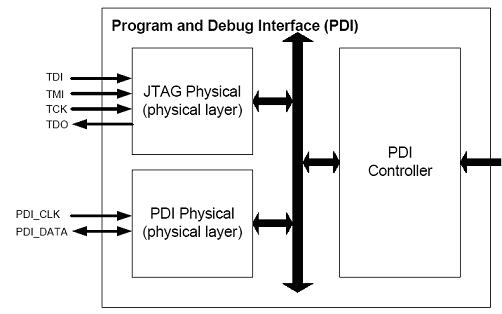
The Atmel XMEGA AVR microcontroller family feature either one or both of the following physical interfaces:
|
Interface
Name |
Interface description |
Number of interface signals |
XMEGA pins required for programming |
|
PDI |
Program and Debug Interface |
2-wire |
· PDI_CLK
· PDI_DATA |
|
JTAG |
JTAG Program / Debug Interface |
4-wire |
· TDI, TMI, TCK, TDO
· RESET (optional) |
A graphical overview of the ‘PDI’ and ‘JTAG’ interfaces is shown in the diagram above.
|
 |
XMEGA PDI - ISP Connections |
|
|
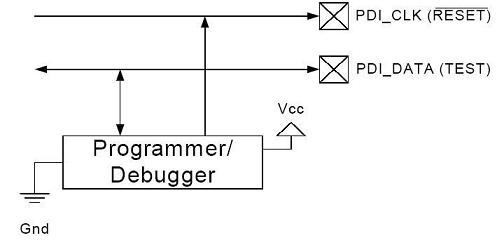
The Program and Debug Interface (PDI) is a 2-wire interface which allows an XMEGA microcontroller to be programmed using an external programmer. The pins required for programming via the PDI interface are detailed in the table below.
|
PDI Signal
Name |
Signal description |
Direction from programmer |
Pin name on XMEGA device |
|
PDI_CLK
|
PDI Clock Signal |
Output |
RESET |
|
PDI_DATA |
PDI Data Signal
(bi-directional) |
Bi-directional |
TEST |
|
 |
Equinox Programmer Support |
|
|
The ISPnano family of programmers represent the ultimate solution for production In-System (ISP) programming.

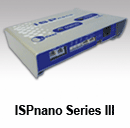 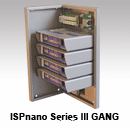 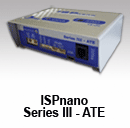 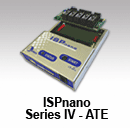
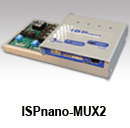 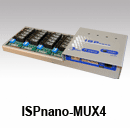 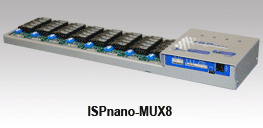
Click on the picture of a programmer to view the full programmer description page.
|
| |